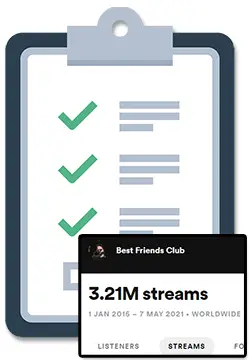Whether you’re a seasoned producer or just starting out, understanding the music production timeline can be super helpful in giving a framework to follow for completing a song, album, or EP.
The music production timeline can vary depending on the complexity of the project, style of the project, and the workflow of the producer, but here’s a general overview:
- Pre-production: This is the planning stage where the producer works with the artist to determine the direction and overall sound of the project. This may involve songwriting, arranging, and demoing ideas to decide which will make the final cut for the project.
- Recording: This is the stage where the actual recording of the music takes place. This can be done in a professional or home studio and all by one musician or with a team or band of musicians.
- Editing: After the recording is done, the producer will go through and edit the tracks to make sure they are in tune, in time, and that all parts are in the right place in the composition.
- Mixing: This is where the producer blends all the individual tracks together to create the final mix. This can involve technical mixing like adjusting levels, panning, and adding effects as well as creative mixing like sound design and special effects.
- Mastering: The final step in the music production process is mastering. This is where the producer increases the mixes volume to streaming and radio standards and exports the files for distribution.
I’ve personally been part of productions that included full rock bands as well as smaller solo projects creating electronic music and have found that these 5 steps are followed regardless of the genre.
Overall, the entire music production timeline can take anywhere from a few days (particularly if you’re doing a solo electronic project) to several months depending on the scope of the project and the resources available.
Step 1: Pre-production
The pre-production stage is the initial planning phase of the music production process where the producer will work closely with the artist to determine the direction and overall sound of the project.
Tasks at this stage may involve:
- Songwriting
- Arranging
- Demoing songs
- Selecting sounds and instruments
- Deciding the final number of tracks
- Selecting final songs to record
Pre-production is essential to the music production process because it sets the foundation for the rest of the project and because without careful planning and preparation, it can be difficult to create a cohesive and polished final product.
This step can take as little as a day if you’re a solo artist all the way up to several months if the artist is particularly picky or is working with several different musicians.
In my solo electronic project, I’ve found this to take anywhere from 1 day to 2 or 3 weeks.
Step 2: Recording
Once the pre-production stage is complete, the actual recording process can begin which is where the music is physically recorded or composed in a DAW, whether in a professional or home studio and all by one musician or with a team or band of musicians.
During this stage, the producer must work closely with the artist to capture the best possible performances by coaching the artist on their singing or playing, making sure the vibe is right and comfortable, and making sure the equipment is functioning properly.
If you are self-producing, this can be a challenge but I’ve found it best to mostly remember to be patient and kind to yourself at this stage since it can get stressful without any help around.
It’s important for the producer (whoever they end up being!) to maintain a positive and supportive environment during the recording process which can help the artist feel comfortable and confident leading to better performances.
Step 3: Editing
After the recording is complete, the producer will move on to the editing stage which is where they will go through each track and make any necessary adjustments to ensure they are in tune and in time.
Editing is a critical part of the music production process because it helps to refine and perfect the performances.
The editing stage can involve:
- Comping
- Pitch correction
- Time stretching
- Sample editing.
In some instances, it may even be necessary to re-track parts at this stage if any of the initial performances weren’t quite good enough.
I’ve found this stage to be a pretty tedious process since there can be a lot of technical finetuning that needs to be done here, but is always well worth it since this is where a truly professional and modern sound can come from.
Step 4: Mixing
Once the editing stage is complete, the producer will move on to mixing which is where all the individual tracks are blended (aka mixed) together to create the final mix.
Mixing involves adjusting levels, panning, and adding effects to create a balanced and cohesive sound, and can also include “creative mixing” like adding special effects and transitions.
The producer must use their ears and technical skills to ensure that each element of the mix is clear and audible and that the overall sound comes across as professional and pleasing to the listener.
If you are self-producing, I’ve found it useful to “mix as you go” so that there is less work to do at the mixing stage and to help you keep a feeling of progress and momentum since the project
Step 5: Mastering
The final step in the music production process is mastering which is where the producer makes final adjustments through the use of EQ, stereo imaging, compression, and limiting to the overall sound of the mix and prepares it for distribution.
The goal is to create a polished and consistent final product that sounds great on all playback systems and is of the same volume and quality level as similar tracks out on the market today.
I’ve found that newer artists tend to put a bit too much importance on this step (most likely due to the awesome sound of the name) but it’s important to remember 2 things:
- Mastering mostly is just about making things louder
- You can’t “polish a turd” with mastering: a bad mix or bad song can’t be corrected with mastering



